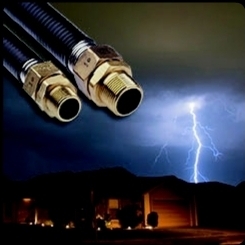Lightning is a tremendously powerful natural phenomenon that varies widely across the country. The force of a lightning strike can damage homes and electrical and mechanical systems, including gas piping. Bonding of gas piping (as required by applicable codes) to the electrical ground substantially reduces this risk. However, builders looking to improve safety for home owners have asked their contractors to change from standard yellow-jacketed CSST to Counterstrike® flexible gas piping.
A large custom home builder in western Pennsylvania was one of the first to specify Counterstrike® in all of its homes. Before the switch, the home builder dealt with several lightning issues a year, but since switching to Counterstrike®, there have been no problems with lightning and gas piping. Home builders in other high-lightning prone areas throughout the mid-section of the country have also switched to Counterstrike®.
The switch makes sense to both builders and the contractors who install gas piping because of increased safety and decreased cost. Unlike yellow-jacketed CSST, there are no additional bonding requirements for Counterstrike® imposed by the manufacturer’s installation instructions.
Counterstrike® must be bonded in accordance with the National Electrical Code NFPA 70 Article 250.104 in the same manner as the minimum requirements for rigid metal piping. However, installers must always adhere to any local code requirements that may conflict with these instructions. Counterstrike® CSST is the most economical approach for gas piping to reduce the problem of damage caused by lightning energy. There are no clamps to attach and no conductor to run to the building’s grounding system.
Starting in 2004, Counterstrike® engineers developed and tested a radically different CSST jacket. This jacket was designed to dissipate lightning energy along the surface of the jacket. Counterstrike® has been shown to be 400 times more resistant to the damaging effects of electrical energy than conventional CSST with the yellow jacket. In some ways, Counterstrike® performs even better than rigid metal pipe because Counterstrike® dissipates the lightning energy as compared to rigid pipe systems that simply transfer the energy to other vulnerable components such as flex connectors or gas-fired equipment.

